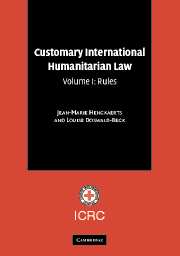Book contents
- Frontmatter
- Contents
- Foreword by ICRC President Jakob Kellenberger
- Foreword by Judge Abdul G. Koroma
- Foreword by Yves Sandoz
- Acknowledgements
- Introduction
- List of abbreviations
- Part I The Principle of Distinction
- Part II Specifically Protected Persons and Objects
- Part III Specific Methods of Warfare
- Part IV Weapons
- Part V Treatment of Civilians and Persons Hors De Combat
- Part VI Implementation
Foreword by Yves Sandoz
Published online by Cambridge University Press: 05 June 2012
- Frontmatter
- Contents
- Foreword by ICRC President Jakob Kellenberger
- Foreword by Judge Abdul G. Koroma
- Foreword by Yves Sandoz
- Acknowledgements
- Introduction
- List of abbreviations
- Part I The Principle of Distinction
- Part II Specifically Protected Persons and Objects
- Part III Specific Methods of Warfare
- Part IV Weapons
- Part V Treatment of Civilians and Persons Hors De Combat
- Part VI Implementation
Summary
The decision to go ahead with a study on customary international humanitarian law depended primarily on the answer to two questions – how useful it would be and how much it would cost – which together give us the famous cost-effectiveness ratio, something that must be taken into account in any undertaking, even if its purpose is humanitarian.
To be sure, applying the criterion of cost-effectiveness is not necessarily appropriate for humanitarian work since it would be cynical to attach a financial price to life and well-being. Nevertheless, those who run an organisation like the ICRC have a moral duty to seek maximum efficiency in the use to which they put their human and financial resources (while seeking to increase those resources). For, as long as there are wars, it will never be possible to do enough, or to do it well enough, to protect and assist those affected.
The international community has given the ICRC the onerous mandate to “work for the faithful application of international humanitarian law”. This imposes a duty of constant vigilance. For the ICRC, impartiality means not only avoiding discrimination between the different victims of a given conflict, but also constantly striving to ensure that all the victims of all the conflicts on the planet are treated equitably, without regional or ethnic preference and independently of the emotions sparked by media-selected images.
This concern to avoid discrimination and to ensure impartiality on a global scale guides the ICRC in choosing its activities.
- Type
- Chapter
- Information
- Customary International Humanitarian Law , pp. xiv - xviiiPublisher: Cambridge University PressPrint publication year: 2005



